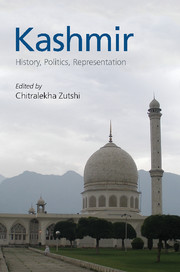Book contents
- Frontmatter
- Dedication
- Contents
- Acknowledgements
- Map 1 Pre-Partition Jammu and Kashmir
- Map 2 Contemporary Kashmir
- Introduction: New Directions in the Study of Kashmir
- PART I HISTORY
- 1 To ‘Tear the Mask off the Face of the Past’: Archaeology and Politics in Jammu and Kashmir
- 2 Contesting Urban Space: Shrine Culture and the Discourse on Kashmiri Muslim Identities and Protest in the Late Nineteenth and Early Twentieth Centuries
- 3 The Rise and Fall of New Kashmir
- 4 Kashmiri Visions of Freedom: The Past and the Present
- PART II POLITICS
- PART III REPRESENTATION
- Contributors
- Index
2 - Contesting Urban Space: Shrine Culture and the Discourse on Kashmiri Muslim Identities and Protest in the Late Nineteenth and Early Twentieth Centuries
from PART I - HISTORY
Published online by Cambridge University Press: 03 August 2019
- Frontmatter
- Dedication
- Contents
- Acknowledgements
- Map 1 Pre-Partition Jammu and Kashmir
- Map 2 Contemporary Kashmir
- Introduction: New Directions in the Study of Kashmir
- PART I HISTORY
- 1 To ‘Tear the Mask off the Face of the Past’: Archaeology and Politics in Jammu and Kashmir
- 2 Contesting Urban Space: Shrine Culture and the Discourse on Kashmiri Muslim Identities and Protest in the Late Nineteenth and Early Twentieth Centuries
- 3 The Rise and Fall of New Kashmir
- 4 Kashmiri Visions of Freedom: The Past and the Present
- PART II POLITICS
- PART III REPRESENTATION
- Contributors
- Index
Summary
Introduction
Shrines – variously referred to as khanqahs or ziarats – are strewn across the landscape of Kashmir. Large ones such as Khanqah-i-Mualla, in downtown Srinagar, draw thousands of devotees on a daily basis, while small ones such as Rozabal, tucked away in the Khanyaar locality, are visited by a few worshippers each day. There are many others, some makeshift, that emerged in particular contexts and now lie abandoned as the living saint who was honored there moved away or the people who revered him left the locality. Indeed, indigenous and other narratives describe Kashmir as a paradise on earth not simply because of its natural beauty, but also because of these concrete, visual remnants of the holy beings that crisscrossed its landscape in the distant and more recent past. The memory of the peregrinations of these saints is commemorated in the stories attached to each shrine, which circulate in Kashmir's textual and oral culture in multiple languages – Persian, Kashmiri, Urdu and now also English.
The prevalence of shrine culture in Kashmir has given rise to the idea that Kashmiris practice a unique, syncretistic form of Islam, deeply influenced by Sufism, which is mystical and hence apolitical. Sufism, as we now know from recent scholarship, was far from apolitical, even in the context in which it arose (Safi, 2000; Renard, 2008), and in the Kashmiri context, shrines of Sufi and other holy figures were more than merely spiritual retreats; they were instead powerful institutions that deeply influenced the course of politics, society and culture. This was in large part because as the recipients of large tracts of revenue free lands, sometimes entire villages, for the upkeep of these institutions, the custodians of shrines were wealthy and powerful landholders. It was in shrines that literature and politics intersected, as partisan battles were/are defined, fought and then won or lost, and the narratives that shaped the discourse regarding these battles were composed. Shrines were thus repositories of a vast amount of information that was distilled into integrated historical and contemporary knowledge about the land, its products, pilgrimage centres, trade routes, medicine, military movements, political alliances, social norms and much else. These facts, rather than the popular notion that Kashmiris have practiced and continue to practice a different kind of ‘Sufi’ Islam, explains why shrines were and continue to be such an important part of Kashmir's social fabric even today.
- Type
- Chapter
- Information
- KashmirHistory, Politics, Representation, pp. 51 - 69Publisher: Cambridge University PressPrint publication year: 2017



